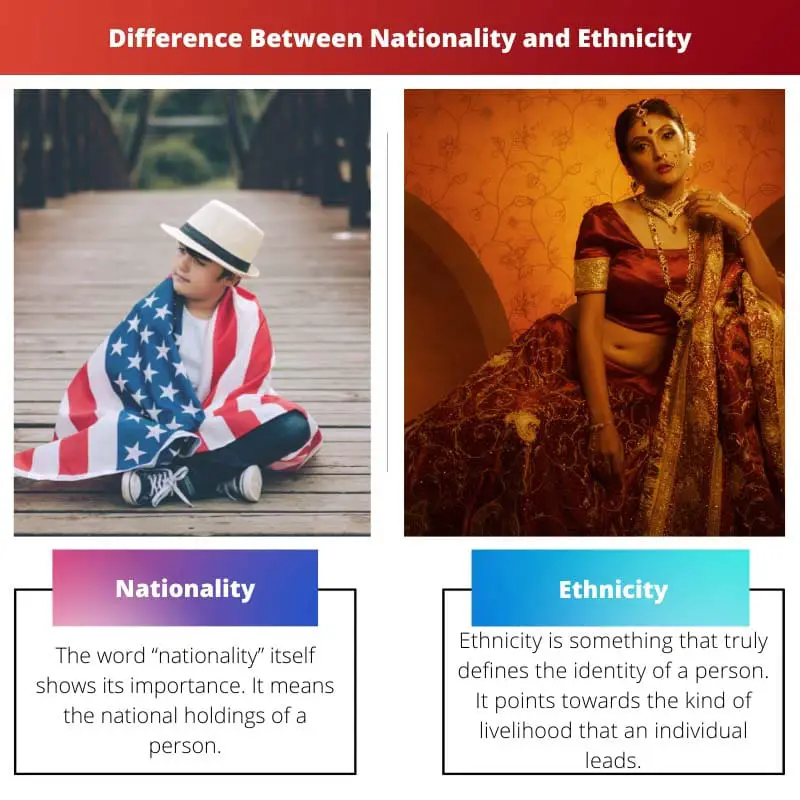All the people in this world are categorized into smaller groups to make it easier to identify them when put against the entire world population. Nationality and ethnicity are two such groups that mark differences in individuals regarding their place and practice.
A person can have the same nationality as well as an ethnic group. And it is also possible for many people to have the same nationality and ethnicity at the same time.
Key Takeaways
- Nationality refers to a person’s legal status as a citizen of a particular country or nation, while ethnicity refers to a person’s cultural or racial identity.
- Nationality is determined by birthplace, ancestry, or naturalization, while language, religion, customs, or physical characteristics determine ethnicity.
- A person can have multiple ethnicities but can only have one nationality.
Nationality vs Ethnicity
Nationality refers to a person’s legal relationship with a particular country. It is the status of belonging to a particular nation, by birth or naturalization. Ethnicity refers to a person’s cultural identity and sense of belonging to a particular group based on shared characteristics such as ancestry, language, customs, and traditions.

Nationality is technically someone’s legal presence and evidence of their belonging. It points towards the origin of a person and is the basis for all their geographic outlines.
A person can’t choose their nationality as they are born into it. And neither can a person try to change the nationality they are born into.
Ethnicity refers to the membership that a person has in a group. Ethnicity is of many kinds. It can be religious, cultural, political, racial, or any other.
A person can choose a type of ethnic group. But some ethnic groups include race and tradition, which are hard to overlook. A person cannot simply choose something new in such ethnic groups.
Comparison Table
| Parameters of Comparison | Nationality | Ethnicity |
|---|---|---|
| Geographic Distinction | Yes | No |
| Belief And Traditions | No exactly | Yes |
| Is Obtained by Birth | Yes | Not always |
| Can Be Changed | No | Yes |
| Examples | Indian, American | Marathi, Adivasi Tribes |
What is Nationality?
The word “nationality” itself shows its importance. It means the national holdings of a person. No individual on Earth is born without a nationality.
It is because nationality refers to the very country into which a person is born. But certain countries provide their citizenship to citizens of other countries, provided terms and conditions are met.
It shows that nationality is the legal status that a person gains after their birth or because of their parents. People can gain the nationality of a country even if they are not necessarily born in that country.
For example, if a child is born in the US but his or her parents are Indian citizens, This automatically makes the child an Indian national.
Therefore, nationality is also called an inherited quality acquired by children through their ancestors, even if it is not present in their genes.
A person’s nationality points to their location or geographical dominance in the world. It is through nationality that a group of people gain feelings.
These could include fierce love for their country, interest in the political happenings of their place, curiosity over the value of the currency, and many more things.
Nationality gives the citizens a kind of responsibility for one another; it makes one big family and there ought to be feelings of mutual respect and pride.
To be a legal citizen of any country, one must either be born there or have parents who are citizens of that country. They can also study in the said country for a specific period, etc.
It shows that there are many ways one can become a nation in any country. Some nationalities include Indian, American, Sri Lankan, Emirati, Kuwaiti, Lebanese, etc.
It is easier to gain nationality in countries like almost all the countries on the American continent and the Middle East.

What is Ethnicity?
Ethnicity is something that truly defines the identity of a person. It points towards the kind of livelihood that an individual leads. An ethnic group can be anything from political parties to religious groups.
The mental and social state of each individual could be figured by the ethnic groups. A person can be born into any ethnic group, and it is hard to change it once they are born into it.
It means ethnic groups such as race and religion are something that almost all individuals are naturally born into, but race is something that cannot be changed, on the other hand, religion is a group that an individual can change later on in life.
There are some ethnic groups based on language and culture. It is something that everyone can decide. People might find something they weren’t born into quite magnificent and appealing.
With the freedom they have, each person can choose which ethnic group fits their mentality the best. They can then naturally learn their ways and traditions to become a part of it.
An example of people switching their ethnicity is when a foreigner visits a country rich in culture. They would find it too alluring, thereby staying in that country longer than the intended period and adopting all of its richness.
Ethnicity indicates the richness and the heritage of a particular set of people, along with their beliefs and cultural qualities. A person’s ethnic background is of massive importance as it explains a lot about them.
Many ethnic groups are not accepted by everyone but still exist and whose members stay within themselves. Hippies and bohemians are two of the most common ethnic groups related to fashion and lifestyle.
These evolved a long time back and are still around. Some ethnic groups are Bengalis, Marathi, Konkani, different tribal groups, and even cannibals.

Main Differences Between Nationality and Ethnicity
- Nationality refers to the national origin of a person whereas ethnicity is the interest and belief of each individual.
- Once an individual gains the nationality of a specific place, it is not possible to cancel the citizenship, but in the case of ethnicity, a person can always choose a new ethnic group after discarding what they believed.
- Nationality is always related to the legal presence of a person in a country, so basically it is the legal status of a person. On the other hand, ethnicity is related to the traditions and culture of a person’s belief.
- Nationality has connections with a person’s geographic origin, whereas ethnicity is not always linked to any geographic area.
- Nationality does not bring about any kind of major behavioral changes in a person, whereas ethnicity does have plenty of effects on a person’s mindset.

References
- https://www.journals.uchicago.edu/doi/abs/10.1086/292997
- https://books.google.com/books?hl=en&lr=&id=Wvk-CgAAQBAJ&oi=fnd&pg=PP1&dq=ethnicity+and+race&ots=rRBa0gmMck&sig=0qPYg13sYf5EksPBaYylkBapmlg
